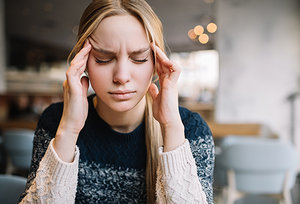Poor Sleep = Migraines
By Editorial Staff
We've talked repeatedly about the negative health impacts of poor sleep, whether inadequate sleep (not enough hours per night), non-restorative sleep (you wake up repeatedly during the night and/or wake up feeling tired, rather than well-rested), etc. Add migraines to the list, according to new research that evaluated sleep disruptions and migraine-like pain using a mouse model.
Why mice? First, it's difficult to convince people to risk migraine pain for a study. Second, mice sleep cycles are extremely similar to that of humans, according to the researchers, who found that sleep-deprived mice were more likely to experience migraine-like pain. Findings appear in the research journal
Brain Communications.
OK, let's transition back to humans. Anyone who's suffered a migraine knows it's something to avoid at all costs. Symptoms include intense pain, particularly on one side of the head; sensitivity to light and sound; nausea; and more. In other words, if getting better sleep is a way to reduce your migraine risk (and the above symptoms), it's well-worth the effort.
How do you optimize sleep? Here are three great ways courtesy of the Centers for Disease Control and Prevention:

- "Be consistent. Go to bed at the same time each night and get up at the same time each morning, including on the weekends.
- Make sure your bedroom is quiet, dark, relaxing, and at a comfortable temperature.
- Remove electronic devices, such as TVs, computers, and smart phones, from the bedroom.
- Avoid large meals, caffeine, and alcohol before bedtime.
- Get some exercise. Being physically active during the day can help you fall asleep more easily at night.”
If you're struggling with sleep, experiencing migraines – or both, talk to your doctor for more information and assistance.

